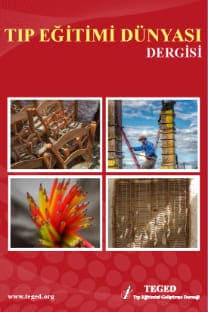İstanbul Tıp Fakültesi 1. 2. ve 3. Sınıf Öğrencilerinin Biokimya Eğitimine Bakışı
İstanbul Tıp Fakültesi, 1. 2. ve 3. yıl öğrencilerinin Biokimya eğitimi (kuramsal ve uygulamalı) ve sınavlar ile ilgili eleştiri, görüş ve önerilerini belirlemeyi hedefleyen bu çalışma, öğrencilerden güz ve bahar yarı yılları sonundaki son uygulama çalışmalarında alınan geribildirimler incelenerek değerlendirilmiştir. Geribildirim formlarındaki çeşitli ölçütler için öğrencilerden 1 ile 5 arasında puan vererek değerlendirme yapmaları istenmiştir (1: kesinlikle katılmıyorum, 2: katılmıyorum, 3: kararsızım, 4: katılıyorum, 5: kesinlikle katılıyorum). Geribildirime katılan öğrenci sayısı 1. yarıyılda n=309, 2. yarıyılda n= 299, 3.yarıyılda n= 306, 4, yarıyılda n= 280 ve 6. yarıyılda n= 233’ tür. 1. ve 2. yıl amfi derslerinin işleniş tekniği pek az öğrenci tarafından beğenildiği ve konuları ilgi uyandırıcı ve öğrenme isteğini arttırıcı bulunmadığı halde, 3. yılda verilen hastalıkların biokimyasal mekanizmalarına yönelik Klinik Biokimya dersi ile ilgili bu açılardan öğrencilerin hemen hemen yarısı olumlu görüştedir. Benzer şekilde, 1. ve 2. sınıftaki uygulamaların amaç ve hedeflere uygunluğu meslek yaşamındaki yararlığı konusuna öğrencilerin çok azı (%30-40) katılırken, 3. sınıf öğrencilerinin çoğu (% 75-80’i) bu bakımlardan olumlu görüş bildirmişlerdir. Öğrencilerin büyük çoğunluğu kuramsal ve uygulamalı sınavlarda çoktan seçmeli test tipi sorular olmasını istemekte, ancak sınavların doğru değerlendirme niteliğinde olmadığını düşünmektedirler. Geribildirim uygulaması öğrencilerimizin memnuniyeti ile karşılanmış ve kendilerine verilen önemin bir göstergesi olarak algılanmıştır. Öğrencilerimizin tümünün genel olarak geribildirime katılım oranı ortalama % 90’a yakın olduğundan sonuçların güvenilirliği çok yüksektir. Sonuçlar, İstanbul Tıp Fakültesinde verilen eğitim sisteminden öğrencilerimizin yarısından fazlasının memnun olduğunu göstermektedir. Ancak klasik eğitimi uygularken eğitimimizin olumlu yanlarını güçlendirmek ve çeşitli yöntemlerle etkinliğini arttırmak ve öğretim üyelerimizin öğrenci ile olabildiğince iletişim kurmaya ve soru sormaya özendirici olmaları gerektiği ortaya çıkmaktadır. Bu çalışma ile elde edilen değerlendirme ve görüşlerin, gelecek yıllardaki Biokimya eğitimimizin planmasında, çekirdek müfredatımızın hazırlanmasında, akademik kadromuzun dersleri işleyişi, öğretim üyesi/ öğrenci iletişiminin geliştirilmesinde yararlı olacağı kanısına varılmıştır.
Anahtar Kelimeler:
Mezuniyet öncesi eğitim, Biokimya eğitimi, İstanbul Tıp Fakültesi öğrencileri, geribildirim
Opinions Of 1st, 2nd And 3rd Year Students Of Istanbul Medical Faculty About Biochemistry Education
The goal of this study was to assess the criticisms, viewpoints and suggestions of the 1st, 2nd and 3rd year of students of Istanbul Medical Faculty about Biochemistry education (theoretical and practical) including examinations. These data were obtained from the questionnaires which were administered to the students at the last practical studies of each term (autumn and spring) and all participants were asked to reply each item in the questionnaire on five point scale as 1=strongly disagree, 2= disagree, 3= not sure, 4= agree, 5= strongly agree. The numbers of 1st, 2nd 3rd, 4th and 6th half-term year of participant students were 309, 299, 306, 280, 233, respectively. The tehcnical presentation of 1st and 2nd year lectures were approved by a small percentage of students. Most of the subjects were not found interesting and stimulating. However, almost half of the 3rd year students had positive viewpoints about clinical biochemistry lessons. As for the 1st and 2nd year practical studies, a very small group of students had positive viewpoints about both the appropriateness of the goals of education and also usefulness in professional life. On the contrary, most of the 3rd year students had positive opinions from this point of view. Most of the students preferred to have test questions with multiple choice in both theoretical and practical examinations. But they have been suggesting that the exams are generally of inferior quality in terms of accurate evaluations. The questionnaires have been received with pleasure by our students and perceived as an index of being considered important. Since the average percentage of participation is almost 90 %, the reliability of the results obtained are very high. Our results indicate that, more than half of our students were pleased with the education system in Istanbul Medical Faculty. However, it appears that positive sides of our classical education should be strengthened and improved by using various processes. Particularly, advanced technologybased facilities should be used by all teachers for improving the teaching efficacy. In addition, interaction skills between educators and students should also be strengthened. It also appears that the students should be encouraged to try to ask questions by the educators. It is concluded that, student opinions obtained from the present study, may be beneficial for future planning of our Biochemistry Education, for preparing our core education curriculum, for improving the teaching presentation of our university teachers and also for improving the teacher/ student interaction.
Keywords:
Undergraduate education, Biochemistry education, medical students of Istanbul Medical Faculty, questionnaire,
- ISSN: 1303-328X
- Yayın Aralığı: Yılda 3 Sayı
- Başlangıç: 2000
- Yayıncı: Tıp Eğitimini Geliştirme Derneği
Sayıdaki Diğer Makaleler
İstanbul Tıp Fakültesi 1. 2. ve 3. Sınıf Öğrencilerinin Biokimya Eğitimine Bakışı
Akdeniz Üniversitesi Tıp Fakültesinde Bir Değerlendirme Uygulaması: Hasta Yönetim Problemleri
Yeşim Şenol, Sibel Çubukçu, Kemal Alimoğlu, Erol Gürpınar
Tıp Eğitiminin Sosyal Yaşam Memnuniyetine Etkisi
Erol Gürpınar, Yeşim Şenol, Mustafa Kemal Alimoğlu, Mehmet Aktekin
Topluma Dayalı Tıp Eğitimi Perspektifinden Kliniğe Giriş Uygulamaları
Dilek Güldal, Çitim Dontlu, Neşe Yeniçeri, Nilgün Özçakar, Okay Başak
Karadeniz Teknik Üniversitesi Tıp Fakültesi Soru Bankası Projesi ve Dinamik Web Modülü
Kemal Turhan, Füsun Yarış, İbrahim Özen
Erciyes Üniversitesi Tıp Fakültesi İntörn Hekimlerinin Adli Tıp Hizmetlerine Bakışı
